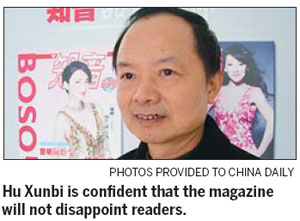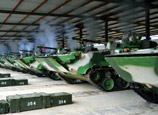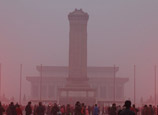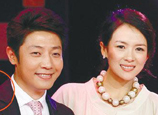
 |
| (China Daily) |
He was not the first one who discovered the potential market. In 1983, a magazine named Family was released in Guangdong province and became very popular. Another magazine titled Readers, China's equivalent of Reader's Digest, caught on soon all over China.
"Those publications proved that my intuition was right and gave me the courage to start my plan as soon as possible," says Hu. He started to lobby the local Workers' Union and the Women's Federation for support.
The first step was to called on members of the public to suggest a name for the new publication.
"The name Zhiyin jumped out from hundreds of submissions. It literally means a bosom friend, which accurately represents my hope for the magazine - to get close to readers, to real people and to their hearts," says Hu.
But having no publishing nor marketing experience, the learning curve was steep and the road to success filled with unanticipated challenges.
"I took it for granted that the new magazine would be financially supported by the local government," says Hu. "I was wrong."
Although owned by the Women's Federation, Hu had to start from scratch.
He received 30,000 yuan ($4,820) as startup capital, and a loan of 70,000.
"Sounds like a lot of money during that time? Indeed, but we had to take care of everything including 3,000 yuan to set up a telephone," says Hu.
Based on preliminary estimates, they had to sell 400,000 magazines to break even. "I felt a great pressure and thought of quitting," Hu says.
The anchor story of the first edition was on arranged marriage, which was common then. "I was confident that the magazine would not disappoint readers."
Hu used many distribution channels. Besides sending to post offices and railway stations, the staff delivered the magazines themselves by bicycles to the emerging newsstands.
Soon, many retailers and book dealers knocked on the door of Hu's office to seek distribution rights. Hu was successful.
In 1987, Zhiyin was sold in almost all the big cities in China, and soon, its circulation reached 1.7 million.
But as more similar magazines emerged, Zhiyin's circulation started to dip. In 1989, it declined to 490,000.
"We were affected by rising printing and distribution costs. And I thought readers felt fatigue reading similar stories all the time," says Hu.
He started to establish a new performance evaluation system in the newsroom to award writers for solid and real-life stories. Zhiyin has since been among the magazines with the highest payment for story contributions.
"The best stories are always from reality," says Hu. "Our stories must come from real life and keep pace with the society."
Zhiyin Magazine has been keeping a hotline to listen to readers' personal problems and those who are looking for a direction in life. It now has an online forum serving the same function.
In 1998, the circulation reached 3 million. Encouraged by the support, in 1999, Zhiyin increased its frequency from a monthly to a semimonthly magazine. Today, it has two other versions - for working-class and overseas readers.
"My mother has been reading Zhiyin for two decades. She is always moved by the joys and sorrows in the stories," says Cheng Jun, 54, a wholesale manager in a publishing house in Beijing, whose mother is 72 years old.
"The young generation has many choices and avenues for similar stories, but for many people, reading Zhiyin has become a comforting habit," Cheng adds.
Zhiyin Media Group is ready to be one of the A-Share listed companies in the Chinese mainland's stock market - the first of its kind as a periodical media company in China.
"Millions of grassroots readers are ignored by popular magazines that target white-collars and high-end consumers in major cities. Zhiyin, however, always sticks to attracting the masses in small cities and countryside, and it has succeeded," market researcher Xia Tian said in a recent interview by Beijing Daily.
"Our society has become more open, and people's spiritual needs are diverse," says Hu. In the past 27 years, no matter how busy, Hu spends time reading readers' letters.
"For example, now many stories are from and about the Internet and cellphones. The young generation is facing new and complex problems and pressures in careers and marriages compared to the period when jobs were secure and arranged marriages were common," says Hu.
Hu disagrees that Zhiyin is only for the less educated. "Our readers are from different ages, professions and social classes, no matter how rich and successful you are as long as you have spiritual needs," says Hu.
"The soul of the magazine will never change, which is to reflect the beauty of love and humanity."

















 Buildings collapse after subsidence in S China
Buildings collapse after subsidence in S China


![]()
